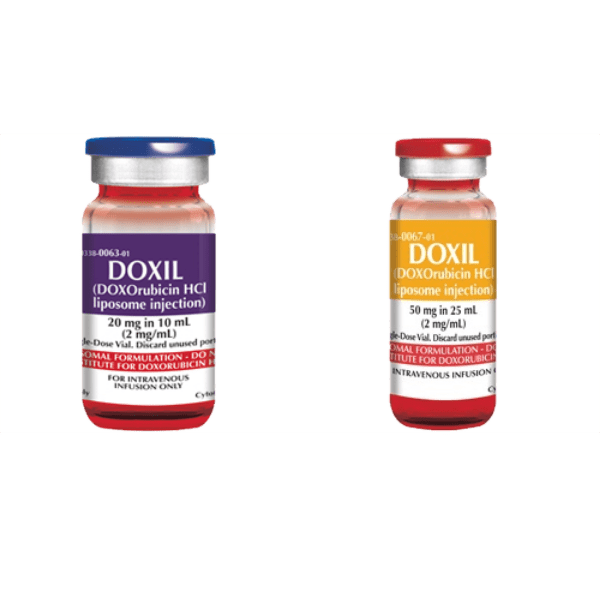Doxil (doxorubicin HCl liposome injection) for Hospital Care

Doxil (doxorubicin HCl liposome injection) is indicated for treatment of ovarian cancer, acquired immune deficiency syndrome (AIDS)-related Kaposi’s Sarcoma, and multiple myeloma.
Please read the full Indication(s) and Important Risk Information, including the Boxed Warning in the full prescribing information.
Ovarian Cancer
Doxil is indicated for the treatment of patients with ovarian cancer whose disease has progressed or recurred after platinum-based chemotherapy.
AIDS-Related Kaposi’s Sarcoma
Doxil is indicated for the treatment of AIDS-related Kaposi’s Sarcoma in patients after failure of prior systemic chemotherapy or intolerance to such therapy.
Multiple Myeloma
Doxil, in combination with bortezomib, is indicated for the treatment of patients with multiple myeloma who have not previously received bortezomib and have received at least one prior therapy.
Product Details
Doxil uses Stealth liposomes to deliver doxorubicin HCl.1 Stealth technology is a liposomal coating that evades detection and destruction by the immune system.2-3 Encapsulation in Stealth liposomes enables protection of the active drug (doxorubicin HCl) to enhance the chance of reaching the tumor. However, Doxil may also affect normal tissue.2,3
- Doxil is a form of doxorubicin HCl encapsulated in stealth liposomes for intravenous use.1
- Stealth allows Doxil to evade detection and destruction by the immune system, which increases the likelihood of reaching the tumor.4
- Doxil has a greater chance to reach the tumor tissue, where the medication is released.
Prescribing Information
DOXIL (doxorubicin hydrochloride liposome injection) >
Indications
DOXIL liposomal infusion is indicated for the treatment of patients with ovarian cancer whose disease has progressed or recurred after platinum-based chemotherapy.
DOXIL liposomal infusion is indicated for the treatment of AIDS-related Kaposi’s sarcoma in patients after failure of prior systemic chemotherapy or intolerance to such therapy.
DOXIL liposomal infusion, in combination with bortezomib, is indicated for the treatment of patients with multiple myeloma who have not previously received bortezomib and have received at least one prior therapy.
Important Risk Information
DOXIL liposomal infusion can cause myocardial damage, including acute left ventricular failure. The risk of cardiomyopathy was 11% when the cumulative anthracycline dose was between 450 mg/m2 to 550 mg/m2. Assess left ventricular cardiac function prior to initiation of DOXIL liposomal infusion and during and after treatment. See additional information on Cardiomyopathy in Warnings and Precautions below.
Serious, life-threatening, and fatal infusion-related reactions can occur with DOXIL liposomal infusion. Acute infusion-related reactions occurred in 11% of patients with solid tumors. Withhold DOXIL liposomal infusion for infusion-related reactions and resume at a reduced rate. Discontinue DOXIL liposomal infusion for serious or life-threatening infusion-related reactions. See additional information on Cardiomyopathy in Warnings and Precautions below.
Dosage and Administration - Important Use Information
Do not substitute DOXIL liposomal infusion for other doxorubicin hydrochloride products.
Do not administer as an undiluted suspension or as an intravenous bolus.
Contraindications
DOXIL liposomal infusion is contraindicated in patients who have a history of severe hypersensitivity reactions, including anaphylaxis, to doxorubicin hydrochloride.
Warnings and Precautions
Cardiomyopathy: Doxorubicin hydrochloride can cause myocardial damage, including acute left ventricular failure. The risk of cardiomyopathy with doxorubicin hydrochloride is generally proportional to the cumulative exposure. Administer DOXIL liposomal infusion to patients with a history of cardiovascular disease only when the potential benefit of treatment outweighs the risk.
Infusion-Related Reactions: Serious, life-threatening, and fatal infusion-related reactions characterized by one or more of the following symptoms can occur with DOXIL liposomal infusion: flushing, shortness of breath, facial swelling, headache, chills, chest pain, back pain, tightness in the chest and throat, fever, tachycardia, pruritus, rash, cyanosis, syncope, bronchospasm, asthma, apnea, and hypotension.
Ensure that medications to treat infusion-related reactions and cardiopulmonary resuscitative equipment are available for immediate use prior to initiation of DOXIL liposomal infusion.
Discontinue DOXIL liposomal infusion for serious or life-threatening infusion-related reactions.
Hand-Foot Syndrome (HFS) may occur.
- HFS was generally observed after 2 or 3 cycles of treatment but may occur earlier.
- Delay DOXIL liposomal infusion for the first episode of Grade 2 or greater HFS
- Dose Modification or discontinue DOXIL liposomal infusion if HFS is severe and debilitating
Secondary Oral Neoplasms: Secondary oral cancers, primarily squamous cell carcinoma, have been reported from post‑marketing experience in patients with long-term (more than one year) exposure to DOXIL liposomal infusion. These malignancies were diagnosed both during treatment with DOXIL liposomal infusion and up to 6 years after the last dose. Examine patients at regular intervals for the presence of oral ulceration or with any oral discomfort that may be indicative of secondary oral cancer.
Embryo-Fetal Toxicity: Based on animal data, DOXIL liposomal infusion can cause fetal harm when administered to a pregnant woman; avoid the use of DOXIL liposomal infusion during the 1st trimester. Advise pregnant women of the potential risk to a fetus.
Females and males of reproductive potential to use effective contraception during and for 6 months after treatment with DOXIL liposomal infusion.
Use in Specific Populations
Lactation: because of the potential for serious adverse reactions in breastfed infants from DOXIL liposomal infusion, discontinue breastfeeding during treatment with DOXIL liposomal infusion.
Adverse Reactions
Most common adverse reactions (>20%) are asthenia, fatigue, fever, anorexia, nausea, vomiting, stomatitis, diarrhea, constipation, hand-foot syndrome, rash, neutropenia, thrombocytopenia, and anemia.